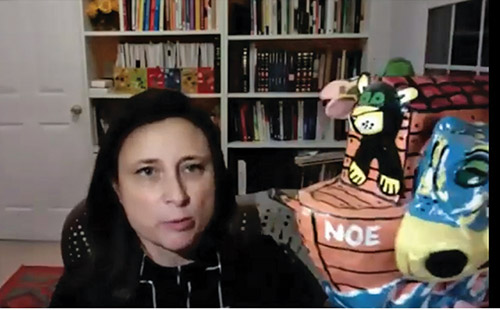

On October 18, Young Israel of New Rochelle’s Women’s Initiative for Jewish Studies opened its seventh year with a virtual event featuring Dr. Erica Brown and hosted by WIJS co-founder and Jewish Link writer and community editor Yvette Finkelstein.
Brown is the director of the Mayberg Center for Jewish Education and Leadership and associate professor of curriculum and pedagogy at George Washington University. She has degrees from Yeshiva University, University of London, Harvard University and Baltimore Hebrew University. She lectures worldwide and is a prolific author. Her newest book is “The Book of Esther: Power, Fate and Fragility in Exile.”
Opening her talk, entitled “Noah’s Vineyard and the Parent/Child Relationship,” she displayed models of Noah’s ark. One was a carved wooden animal version, similar to a paper-cut design. Another was a papier-mâché that she acquired in Cuba. She discussed events after the flood, including Noah’s drunkenness, why it happened and how it related to the parent-child relationship. Brown presented Giovanni Bellini’s famous painting of the event, combining two verses. In the painting, Shem and Yafet look away while covering their father, while Cham looks towards him. Brown interpreted the scene as showing a deeply compromised man who does not know he is deeply compromised. On another level, one may see a deeply compromised father and the sons who are painfully aware of his failings.
Brown queried the audience on why Noah’s first action after the flood was planting a vineyard. Rashi says Noah made himself profane because he should have planted something else first. Midrash Tanchuma explains that Satan asked to partner with Noah in this vineyard. Noah said, “Whether fresh or dry, it is sweet and from which one makes wine, which gladdens a man’s heart.” Satan watered his side of the vineyard with the blood of a lamb, a lion, a monkey and a pig.
Brown noted the alcohol problem on college campuses today and suggested teaching this midrash to our children: A man who drinks one cup of wine acts like a lamb (humble and meek); two cups, like a lion who brags; and four cups, like a monkey hopping about and laughing. When he drinks too much, he is like a pig wallowing in refuse. Noah did all of these.
Rabbi Samson Raphael Hirsch explained that the story of Noah gives a warning: He who does not want to be punished through his children must honor his parents. Rabbi Hirsch understood the need of children to belittle their parents in order to distinguish themselves from their parents and grow into individuals. That kind of attitude, if not quashed early, becomes emblematic of the dissolution of the family, upon which the community and the world is built.
Noah and his sons needed to create a new world where good overcomes bad. It was Shem and Yafet who tried to save the dignity of their father.
In this new world, will people be afraid to confront a family member’s negativity and say it isn’t OK? Evil will always exist, and evil towards parents is the greatest evil of all. Brown’s message was that we are not here to build a flawless world; we are here to build the best world that we can.
Brown concluded with Erich Fromm’s commentary on Noah: “We aren’t rid of an evil world, we just manage it better. So goodness can override any capacity of evil.”










